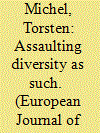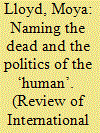| Srl | Item |
| 1 |
ID:
190698


|
|
|
|
|
| Summary/Abstract |
Dehumanisation is one of the most invoked factors in analyses of mass atrocities with many scholars focusing on its crucial role in enabling perpetrators to inflict violence on their victims. However, while its application is widespread, its relevance is often assumed a priori, with claims regarding its empirical relevance often asserted rather than argued for. Not only does its meaning, nature, and function remain amorphous, current scholarship also lacks a general conceptualisation of the basic features that bind the manifold appearances of dehumanisation together. It is this paucity of sustained reflection and particularly the lack of conceptual clarity that the present article seeks to address. Drawing on the work of Hannah Arendt, it aims to deliver a more thoroughgoing appraisal of the nature of dehumanisation as a fundamental violation of plurality to conceptually consolidate and ground its meaning and bind together its diverse manifestations across cases of mass violence.
|
|
|
|
|
|
|
|
|
|
|
|
|
|
|
|
| 2 |
ID:
151639


|
|
|
|
|
| Summary/Abstract |
The summer of 2014 saw several campaigns to name the dead of Gaza. This article aims to explore these initiatives through the idea of the ‘human’; understood both in terms of grievability, as a life that matters, and as a ‘litigious name’ employed by subaltern groups to make political demands. My argument in this article is that politically not all attempts at nomination are equivalent and that a distinction needs to be drawn between those carried out on behalf of the ‘ungrievable’ and those engaged in by them. Only the latter enables a critical politics of the human potentially capable of transforming the prevailing order of grievability in order to make their lives count. After exploring the interventions that occurred in Gaza in 2014, I turn to how the Western (and Israeli) media represent international deaths to consider what that reveals about the differential valuation of human life. To help make my case I elaborate the idea of an order of grievability. I then explore various attempts by others to name Gaza’s dead, and the limitations of their ensuing politics, before finally examining the activities of Humanize Palestine as an example of a more radical, critical politics of the human.
|
|
|
|
|
|
|
|
|
|
|
|
|
|
|
|